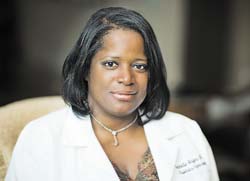HEALTHIER YOU: Dealing with infertility
April 13, 2017 by Las Vegas Black Image Magazine
Filed under Health, Highlights
BY DR. ANNETTE MAYES, OB/GYN
Some women are faced with the challenges that come with the inability to conceive a baby.
Infertility is generally defined as the inability to get pregnant after one year of unprotected sex. Women who do not have regular menstrual cycles — or are older than 35 and have not conceived during a six-month period of trying — should consider making an appointment with a reproductive endocrinologist, or infertility specialist. These doctors may also be able to help women with recurrent pregnancy loss — typically defined as two or more spontaneous miscarriages.
Pregnancy is the result of many steps. A woman’s body must release an egg from one of her ovaries, and a man’s sperm must join it along the way. The fertilized egg must go through a fallopian tube toward the uterus, where the egg must attach to the inside. Infertility may result from a problem with any one or several of these steps. Women need functioning ovaries, fallopian tubes, and a uterus to get pregnant. Conditions affecting any one of these organs can contribute to female infertility.
About 6% of married women in the U.S. ages 15-44 are unable to get pregnant after one year of unprotected sex. About 12% of women in that same age range have difficulty getting pregnant, or carrying a pregnancy to term, regardless of marital status.
Both men and women can contribute to infertility. A Centers for Disease Control study analyzed data from the 2002 National Survey of Family Growth and found that 7.5% of all sexually experienced men younger than 45 reported seeing a fertility doctor during their lifetime. Of those men who sought help, 18% were diagnosed with a male-related infertility problem, including sperm or semen problems (14%) and varicocele (6%).
For additional information, contact the Las Vegas All Women’s Care Offices at (702) 522-9640. Or visit us at 700 Shadow Lane No. 165 (1st floor) in Las Vegas.






